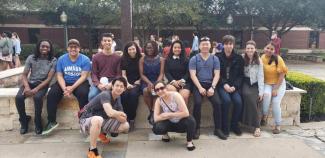One Family—Learning Alongside International Students

Janet, a Nigerian student at the University of Massachusetts Boston (UMass Boston), recently shared news from her home country: stories of kidnappings, corruption, and abuse from church leaders. Her friends think she’s fortunate to be in the US. But Janet recognizes that if she chooses to raise a family here, it will have its share of challenges as well with navigating historical racial tensions that continue to affect us today.
Through my role as a Campus Staff Minister at UMass Boston, I have heard from many students like Janet. They’ve taught me about the particular weight they carry here in the US. During the summer, when it looked like a law would be passed forcing international students to leave the US, it exposed the international community’s unique vulnerabilities. And this year, we’ve also seen the pandemic reveal the ostracization of Asians and Asian Americans, and protests around racial injustice span the globe.
On campus, we often neglect to invite international students into conversations about racial injustice, assuming they aren’t interested or won’t understand without knowing the full context of issues in the US. But as Christians called to reach the nations and honor God’s heart for justice, we must share a full gospel—one that confronts injustice wherever it takes place—and make space for international students to meaningfully engage with God’s Word in our US context with us and in their own way.
Real Hope: A Gospel that Embraces All of Us
God cares about our unique cultural and ethnic identities. In John’s vision of the new Jerusalem, “the kings of the earth will bring their splendor into it” (Rev 21:24). At the same time, each of our cultures and countries have an incomplete understanding of justice that leaves harm unchecked and certain people and groups dishonored. It is only in the system-shaking work of Jesus that our multiethnic, multinational chapter at UMass Boston can embrace all the cultures represented in our midst while looking beyond our individual perspectives to God’s fuller picture of wholeness.
The Lord sees the ways we oppress others. His Word convicts us and invites us into a path of freedom. God sees the marginalized; Jesus himself described his purpose on earth to proclaim good news to the poor and to set the oppressed free (Lk 4:18–19). He modeled this as he washed feet, healed the sick, condemned the temple system’s exploitation of the poor, and called for the inclusion of the poor, women, children, and foreigners. In our chapter, we are exploring how we’ve been excluded and overlooked and also how we contribute to systems of oppression. We are learning that Jesus alone can hold these tensions and make something beautiful out of them.
We find joy in partnering with God as he works through us to bring healing to others. Meaningful conversations in our community about ethnicity and justice have helped us live out the goodness of our ethnicities in a way that reflects God’s character to our campus. Studies on Scripture such as Revelation 21 help us to know God and his purposes better and see that each of us have gifts to contribute to God’s vision of a community. Pursuing justice in and around our community is one way that we make sure that different cultural gifts are seen and valued and shows the broader campus community more of who God is.
The Gifts of International Community
As we study passages like Matthew 28:19–20 from a multiethnic and multinational lens, we are seeing more of God’s design for all nations to honor him. Our international students help represent the global church in our US context. They challenge our chapter to persist in prayer for righteousness in our justice systems, economic structures, and the hearts of leaders. Cristy, a student from Honduras, has brought updates from Honduran elections to prayer meetings, teaching us to hear stories far from home and pray with personal connection.
Global voices also offer a healthy perspective to the American church for the ways we have strayed from God’s call “to act justly and to love mercy and to walk humbly with [our] God” (Mic 6:8). In processing current events, Cristy used to see the American church as “a big brother or sister, representing what God was doing in the church in the world.” But today, she shines a light on ways the American church has often been silent on racism and immigration ethics. Our pursuit of justice and our evangelism are interconnected—the American church’s obedience to God’s call to pursue justice at home affects our witness abroad. We need voices like our Latina sister’s to better understand our witness to the campus and world.
Equipping International Students Here & At Home
As Americans in our chapter learn to see injustices more clearly, students with international and multinational identities can also be called to seek justice alongside us. In Jeremiah 29, God calls the people of Israel to seek the shalom, or wholeness, of the city where they’d been exiled far from home. Similarly, God has called Cristy to learn about and care for her Black friends in the US, just as she hopes the American church will learn about and care for the people of Honduras.
International students are equipped to bring hope back home as we invite Jesus into our ethnic identities together. As Cristy engaged with the history of racism in the US, she drew a connection to Honduras, recognizing her power and privilege as a light-skinned Honduran. She now longs to see God heal divisions of colorism.
Next Steps
For those of you who aren’t on campus, here are some actions that have helped our campus community grow to better reflect God’s heart for shalom and justice:
1. Humbly Invite Jesus into Your Story
To bring healing to others and have healthy conversations about race, ethnicity, and nationality, we need to experience healing ourselves and grow in self-awareness. Learn the history of your people group(s). Ask God how he sees you.
2. Pursue Justice as One Body
If we are growing into a family of God, the issues that affect one member of our family affect us all (1 Cor 12:26). This spring, as news of COVID-19 spread, our small group of mostly Black American and African international students spent a night praying against isolation for international students from China, asking how we could care for them. Pray as a community for local and global justice, research other groups advocating for causes in line with God’s heart, and partner with them.
3. Listen to Others’ Stories
To love our friends and neighbors of other countries well, we must humbly receive their stories. Read books or watch movies from a different cultural perspective. Find ways to learn and get involved in justice issues that don’t directly affect you.
In our fellowship, Freddy, an Egyptian American, and Sahmeer, a Haitian American, read The New Jim Crow together to learn about US mass incarceration.
As I’ve taken these steps myself, I’ve grown in compassion for other people and cultures. I have a deeper relationship with Jesus as I see the ways he brings beauty out of complexity. May we all follow Jesus in pursuing his justice as we reach the nations with his good news.






